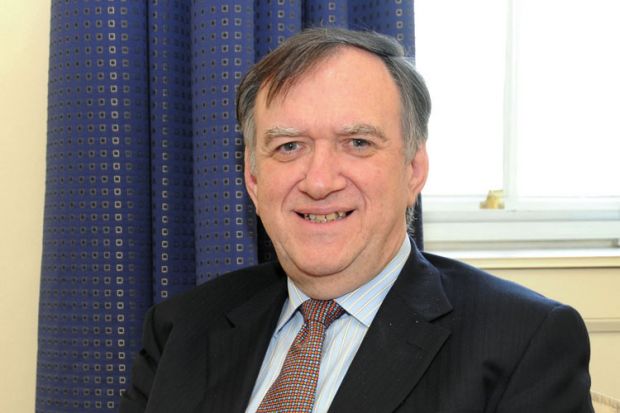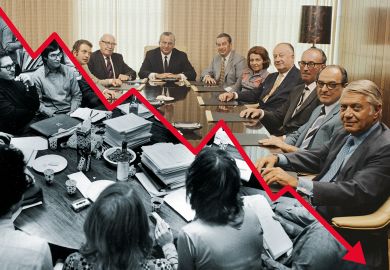If, in 500 years, archaeologists stumble upon the remains of Sir Bob Burgess under a spaceship parking lot in Leicester, they might well be puzzled by the yellow helmet the skeleton is wearing.
But any of them with the wit to search through the dusty annals of Times Higher Education will no doubt solve the mystery: Burgess has become indelibly associated locally with the children’s television character Bob the Builder, thanks to the seemingly never-ending series of infrastructure projects he has overseen during his 15-year reign, which draws to a close when he retires in September.
Burgess arrived at Leicester after a decade in senior management at the “can-do” University of Warwick. His deep involvement with graduate education, which included the establishment of Warwick’s graduate school and the UK Council for Graduate Education, piqued his interest in an institution whose student cohort was 50 per cent postgraduates, and his appetite for a challenge convinced him to take on the selection committee’s brief to lift Leicester out of mediocrity.
When he arrived, he says, he “got the feeling that people were easily satisfied and that if no external visitor was saying what they were doing was bad, then they were doing a decent job”.
Burgess’ mindset was very different: he studied league tables “avidly” and set out to instil a “constructive culture” in which academics were “competitive, enthusiastic and interested in a culture of winning”.
One example of this approach was the pressure he put on departments facing visits from the Quality Assurance Agency (which then assessed universities subject by subject) to “demonstrate they were fulfilling all the requirements”.
“I remember a member of staff arriving late at the meeting where we were given our score. He asked me whether we had got 23 or 24 [out of 24]. I was really pleased with that question because it demonstrated that expectations had shifted,” he says, noting that consistently high scores soon became the norm.
Immediate makeover
The campus renewal began with Burgess’ first trip to Leicester’s university library in 1999. Noting the temporary cladding on its side, he was informed that it had, in fact, been there since the mid-1970s.
“At that point I decided that enough was enough: we were having a new one,” he says, adding: “Alumni used to turn up for reunions and delightedly tell me that nothing had changed since they were a student. Sometimes they had been here in the 1950s.”
The extensive refurbishment and enlargement of the David Wilson Library, which was completed in 2008, “sent out the message we were changing things for the better” and raised Leicester academics’ expectations about “the environment and culture they wanted”.

That £14.5 million of the £32 million cost of the library project was obtained through fundraising also demonstrated the potential to tap into philanthropy and alumni networks for other capital projects. The latest and largest of these is a £42 million Centre for Medicine, for which the university’s development team – established by Burgess – hopes to raise £10 million.
Burgess’ identification with Bob the Builder was further cemented by the appearance of a number of other new buildings on campus, including student residences, sports centres and academic buildings.
His profile was further elevated by taking on a series of national roles, such as chairing Ucas and, more recently, the Higher Education Academy. He still sees a bright future for the latter, despite the announcement in April that the funding councils will discontinue all funding by 2016-17.
Burgess also led the 2007 review that led to the creation of the Higher Education Achievement Report, which documents students’ wider achievements at university. Dismissing suggestions that the reports have not caught on as widely as he might have hoped, he notes that 125,000 will be issued this summer. They are highly valued by “a lot” of graduate employers, he says, adding: “The students of the universities that don’t issue them will be asking why.”
He sees no threat to the Hear from the pilot at 21 universities of a grade point average system – which he also oversees – noting that the two are not incompatible.
Other national roles for Burgess include chairing the National Centre for Social Research, a post he took up in 2012, and the leadership this year of Research Councils UK’s independent review of its open access policy.
Nevertheless, it is the 2012 discovery of the remains of Richard III under a council car park that did most to bring Burgess and Leicester to public attention. He lauds the achievement as a demonstration of the value and excitement of research, but he accepts that the single-focus fanfare risked Leicester being seen as a one-trick pony. It was for that reason, he says, that he launched the Legacy of Leicester campaign last year, highlighting six more of the university’s research milestones, including the 1975 identification of a black hole and the 1984 discovery of DNA fingerprinting.
Burgess admits that the university sector has become more highly managed during his career, and he regrets some of the excesses of the recent rise of performance management, such as requiring academics to attain a certain level of grant income. “You could do a splendid piece of work on a £5,000 grant: the significant thing is that you won it in competition with other people,” he observes.
But he insists that management is “not a dirty word”, provided it is about “allowing people to do more, and do it more effectively”. And although the increased demands on academics – from managers and students alike – makes the life of a modern academic “harder” than in his early days, Burgess says, it is still a career he would pursue.
“People can still write great articles and important books, influence policy and engage in discovery. Higher education is really exciting – and continues to be.”
Register to continue
Why register?
- Registration is free and only takes a moment
- Once registered, you can read 3 articles a month
- Sign up for our newsletter
Subscribe
Or subscribe for unlimited access to:
- Unlimited access to news, views, insights & reviews
- Digital editions
- Digital access to THE’s university and college rankings analysis
Already registered or a current subscriber? Login





